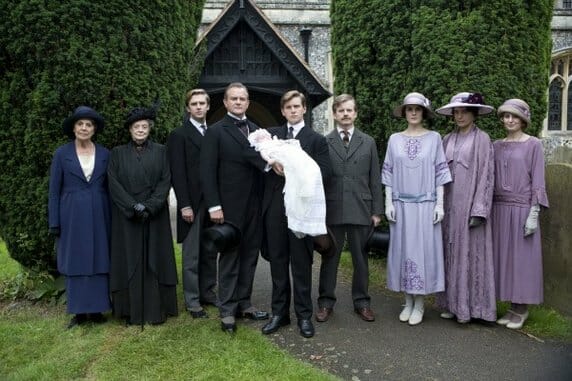
I’m of two minds about last night’s Downton Abbey. In most regards this was the strongest episode of the season, a return to form that, while perhaps not as consistent as episodes in the first season, at least had the same hallmarks, the same wit and verve. But “Episode Six” also centered around homosexuality, and like many other issues the show’s dealt with, the execution is disappointing, even while it’s obvious the show’s heart is in the right place. This was at times painful to watch and highlighted some of the more consistently bad (and, perhaps worse for the show’s watchability, blatant) aspects of Downton’s conservative politics.
Thomas the servant is Downton’s single homosexual character, which would be less of a problem were he in any way dignified or empathetic. Unfortunately, though, Thomas is also the show’s villain, the schemer who lurks in Downton’s shadows and cares only for himself. He embodies an old and terrible stereotype, the homosexual as deviant, as criminal and against the social order. This role allows heterosexual audiences to feel superior or, at the very least, comfortably amused by gay characters.
That’s the broad outline of Thomas’ always problematic character, but in “Episode Six” things are even worse. Thomas embodies heterosexual fears of homosexual rape, as he kisses a sleeping James in an ambush. After this he’s supposed to be empathetic, but the story revolves around heterosexual pity, again playing up their superiority. I recognize that there are aspects of this plot that are historically accurate, but that doesn’t excuse the portrayal. The juxtaposition between Bates and Anna’s happy domesticity with Thomas’ sobbing in the rain could not be more obvious. There’s a vast gulf of difference between pity and empathy, and it’s clear how Fellowes and Downton view homosexuality.
I still fully enjoyed “Episode Six,” though, partially because even the handling of Thomas’ story was energetic. For instance, Bates’ return could easily have been as much a slog as his time in prison, but rather than dwelling on things the episode offered a dozen brief conversations that brought the story resolution. The show has rarely used its large cast so well, and the constant cricket preparations kept conversations from bogging down. The drama meter was finally dialed back from 11, and even the Earl only had one temper tantrum.
Much of the episode felt so delightful that it was the real surprise twist of the season. And not only was it a return to form, it also left almost nothing unresolved. It also felt like, to some extent, there’s no reason for the show to continue. “Episode Six” put Downton in a happy light after a season of misery, and its cheerfulness felt like a fitting way to end to the season, if not the show itself (the British version of the season ended here). I also say that because with every season Downton has lost more of its focus and a great deal of its quality. With Julian Fellowes still insisting that he write every episode himself, it’s hard not to assume that this downward trend will continue. So I look forward to next week’s episode with trepidation, since its job is to take away the finish achieved here and create cliff-hangers for the next season.
Stray observations:
•Bates: “I can’t believe I’m here. I keep pinching myself.” – I felt the same way. Some of the show’s bump in quality came from simply being done with the prison.
•The film discussion on the way back was ripped straight from Fellowes’ Gosford Park. So apparently he’s no longer just recycling parts of Downton.
•After a full season of being gone, Suzette was back and prominent. Speaking of which, this episode’s production values seemed extremely high.
•There’s laughter. “Mr. Carson, you’d better come.” Laughter is always against the rules.
•“Automobile refurbishment.” “He means car repair.” – Umm, they of all people need that distinction?
•You get the feeling that Mrs. Hughes has been hanging out a lot with the Dowager Countess lately.
•“I think he’d like to walk normally, sir. Even if playing cricket was the price he had to play.”
•Who exactly was Ethel was calling… Google? There was a service in 1920s Britain that had information about every citizen?
•The “my wife is in an asylum” ridiculousness was awful when it was invented and horribly outdated by this period. Leave it to Fellowes to bring back one of the most mysognistic tropes of the Victorian era.
•What exactly does “as if her home were in a tree” mean?